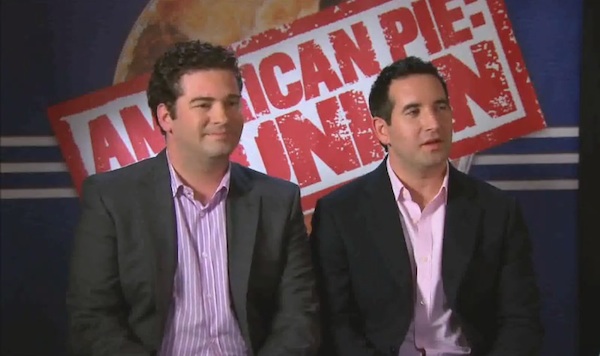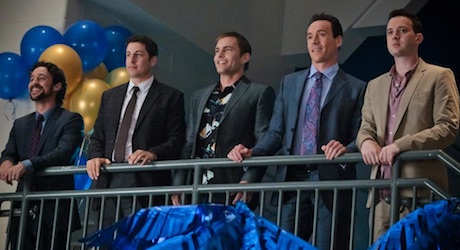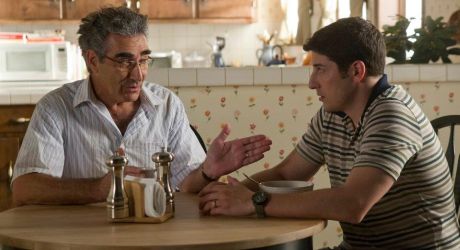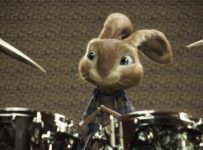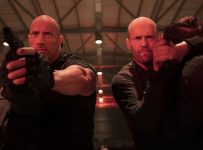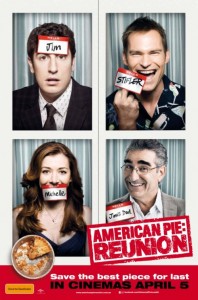 American Reunion, known locally as American Pie: Reunion, is released in cinemas around the world this week and we were lucky enough to speak with writers/directors Jon Hurwitz and Hayden Schlossberg on bringing this classic franchise back to the big screen.
American Reunion, known locally as American Pie: Reunion, is released in cinemas around the world this week and we were lucky enough to speak with writers/directors Jon Hurwitz and Hayden Schlossberg on bringing this classic franchise back to the big screen.
Hurwitz and Schlossberg are perhaps best known to comedy fans as the writers and creators of the Harold & Kumar series that began with 2003’s Harold & Kumar Go to White Castle. After director its sequel, and writing the third film, the pair have reunited on another classic comedy series.
We spoke to the pair on the process of writing a comedy, from coming on board someone else’s creation, shocking audiences in the 21st century and some of their potential upcoming projects, including 21 Shots and Grandma Vs. Grandma. As you will see from the transcript below, this is a pair of writers who love talking about their craft and the serious business of comedy.
We need to thank Universal for inviting us to this interview, and of course Mr. Hurwitz and Mr. Schlossberg for their generous time and answers.
American Pie: Reunion is released in Australia on 5 April 2012 from Universal.
It’s been 13 years since the first American Pie, and I guess that film gave movies permission to be naughty again since the heyday of the 80s. You’ve obviously followed that in between with the Harold & Kumar films. So for you guys, how much of an influence was the original American Pie?
JH: It’s funny because, you know, we were friends from high school, and when we were in high school we started talking about maybe writing films together. Then in college we started writing together before American Pie came out. Our big thing at the time was there hasn’t been that R-rated youth comedy in a very long time. Now the Farrelly Brothers had done stuff like There’s Something About Mary, so we were big fans of that kind of outrageous comedy. We loved movies like Revenge of the Nerds, Porky’s and those kind of movies. For us, our goal when we started writing was we’re going to do a youth comedy, and it’s going to be R-rated and the characters are going to look and sound like real young people, and they’re going to be talking about things that real young people care about.
HS: In the States, the rating system is ridiculous when it comes to comedy. There was a PG-13 rating that really killed comedy.
JH: It killed comedy for a long time.
HS: Where studios wanted to make every movie a PG-13 comedy, which meant you’re not being allowed to swear, and sexual things are almost completely forbidden. So, every high school movie that’s PG-13 has almost no authenticity to it,because most teenagers, all they’re talking about is sex, and swearing and doing all that stuff. It’s never usually in a dark, twisted way like the media makes it out to seem in a really hysterical context. For us we noticed this huge gap…it’s like Animal House and Porky’s, then almost every high school comedy was like ‘Let’s take a Shakespeare play, but like set it in high school’. That could be good, but it’s not funny. It’s not making me laugh our ass off.
JH: So our main thing was, we’re going to bring it back. We had finished our first draft of our first script, and then we saw the trailer for American Pie. I remember calling Hayden up, because I saw the trailer first. ‘Somebody made our movie. They did it. There’s a kid getting caught masturbating. Our first scene is a kid getting caught masturbating’. It was frustrating but exciting at the same time. We saw the movie and just loved it. It was one of those things that we were thrilled that it worked. We had finished our script, and on the wake of American Pie, we sold our first screenplay while we were in college.
HS: It wasn’t so much an influence on us, as it was inspirational. Ok, we’ve got to get our act together. It’s already happening. For us, it’s beyond just the novelty of doing it. It’s really, like I said, for realism’s sake. We need to start seeing comedies out there that feel like the types of comedy happening in our daily lives, which is usually outrageous.
JH: We were friends from high school. We were known in high school for fearless comedy, just pushing the envelope, saying the things no one else would say. Doing things that were a little outlandish or were a little uncomfortable at times, and it was just one of those things. If this is what entertains everybody around us, that’s what should be in movies. American Pie really helped usher in a whole new era of that.
Yeah, I was just going to say: flash forward to 2012 and is it harder to shock people now or is it easier?
JH: I don’t think it’s any harder or easier, there are just certain things that are not as…people are more used to. Let’s just say nudity, male nudity. That’s not going to be enough. But it never was just enough. American Pie wasn’t a huge success because Shannon Elizabeth got naked in it, and just because he had sex with a pie. It’s because it had those scenes in a way with characters that you believed in for a second. It’s more about creating a new story or a new character. Every movie has a fart joke, a shit joke, nudity, swearing and all that stuff. It’s the context its in that’s new.
HS: What we always talk about people asking us about the outrageous set pieces and all that kind of stuff, but we start writing the movie, we’ll come up with those kinds of ideas. What we’re most focused on is how you have an audience frankly give a shit for 90 minutes or 120 minutes. You’ve got to find a way to get people legitimately emotionally invested in these characters, because if they’re not, nobody is going to care when the nudity happens, or as much when Jim is in a situation where he’s showing his penis. You try and make it where people are along for the ride, that’s when you try and find those moments where they’re least expecting it. This happens, or that happens. Have them experience those outrageous laughs in a whole new way when you’re already hooked in.
So given that those characters were well and truly established in three films, what was it you both hoped to bring to the table in this particular film?
JH: I think it was just that we were of the age of the characters, we grew up with them. We wanted to find situations and life experiences that people of our age range could really rrlate to in way…Everybody who went to high school knows a guy like Stifler, or a guy like Jim,
HS: …or was desperate to have sex for the first time.
JH: Yeah, or going through that. We didn’t want to change the characters too much, because people love the characters. We want to put them in new situations that people in their 30s can relate to. Being married, and having kids and not having sex: that’s classic. People are going to relate to that, just like the kid in high school, the virgin who’s trying to have sex. In a way, it’s the same thing that Jason Biggs is doing, but for an older group. With Stifler, he’s a complete asshole in high school, and he’s a complete asshole today, but he’s in his 30s. He’s not in high school, he can’t get away with that stuff anymore. So life isn’t as much fun as it is for him. Thinking about other people our age. There’s always someone who comes back to our hometown who’s more of the celebrity or more of the success in that case. We’re really excited to explore the concept of your first love with this movie, because you’re seeing characters that your saw 13 years ago say ‘I love you’ for the first time. Now here you are 13 years later, and you have an opportunity for fans of the franchise to really have a sentimental moment. We just wanted it to feel real for the fans.
HS: Bringing that all together, it’s just taking characters you know and love and then revisiting them at a different stage in life. Because we had such a love for those original characters, and knew them so well, and we felt we knew why that worked we felt we could just project ahead. That would be fun for people. Basically, we’re American Pie fans and we made the American Pie film we wanted to see.
With all those characters, obviously it was really important to get all those characters back. Were they all on from the beginning or was that a struggle to get them?
JH: Absolutely. When first were approached, there was the general understanding that we, first of all, wanted everybody back. The studio understood and appreciated that, and they wanted everybody back. They put out feelers. Deals don’t get made, and things don’t get finalised until there’s a script. So we had to take a leap of faith that we’d be able to get everybody back, but we met with some of the cast and we just hoped that if we’d gotten some of the core members that everybody else would want to join because its a real American Pie movie. We felt confident that would happen.
HS: It’s just one of those things that we felt like we loved that first American Pie film so much because of the ensemble nature of it, and you care about each and every cast member in the film. It was important to us that when we were writing this script that everybody had something to do. It wasn’t going to be like American Wedding where Oz isn’t in the movie, and Kevin may be in the movie, but he’s in scenes and not really given anything. So for us it’s about making sure everybody has a fulfilling storyline, so when they have a conversation with us, they’ll see that it’s worth coming back. That was the big thing for us.
So in terms of that script, how tightly was it, and how much freedom were those characters given to explore?
HS: When you are writing a movie with this many cast members it really needs to be economical and well-constructed. You need to be able to not leave a character for so long that you’ve lost track of them. There’s a lot of juggling to do in a script like this. But within that, we always say when you’re writing a script, you’re putting the characters into certain situations, and from there the situation can grow and the opportunities can grow. All of these actors, because they have such a history with the characters, have their own perspective. They’ve lived with these characters. They walk down the street and people are shouting ‘Stifler’ or ‘Jim’ or ‘Finch’ to these guys. They have insights that insights that a studio exec or producer or writer coming on don’t necessarily have.
JH: If it doesn’t feel right for them they’re usually right. The one thing was we wanted to take these actors and put them in new situations that they haven’t experienced, and there were times where the actors weren’t so much against it, but they hadn’t had the experience. Like Eugene Levy, in the first three movies, he does pretty much the same thing. He has the awkward conversations with Jim, and in this movie we made it where his wife passed away. So he has a couple sentimental, sad moments, and then he has scenes where he’s getting drunk and he’s just as outrageous as the kids. So that was all new terrain for him, and I think he loved the idea of it, but that’s where we had to make sure he was embracing it fully. Things like Seann in this movie: in the first movie he’s a character that pops in and doesn’t have much of a story arc himself, and this time he’s obviously a beloved character in the movie. We wanted to give him a fully explanation of where he is in his life. So those moments for him are actually kind of outside the realm he’s used to.
HS: Yeah, the typical comfort zone. For us, we want Stifler to be an underdog in this movie. We want people to emotionally feed sad for Stifler in the first act, so they’re rooting for him to succeed. It gives you a little bit of freedom where he can be a little pervy like he always is, and do crazy things in the second act of the film, but as we say in the movie, he’s their dick. He’s the dick in the group of friends, but that doesn’t make him not a friend, it doesn’t make him somebody that you shouldn’t care about. So it was fun to take these characters and put them down different paths, and getting the input from the actors was invaluable.
And finding a balance between sentimentality and comedy. There’s so many comedies where you introduce the sentimental bits and it stops the comedy dead.
JH: Yes!
HS: Exactly.
So bringing something like this, which is clearly nostalgic, how do you find that balance.
JH: You know, you just find it. The great thing about American Pie is that there’s a template with the first movie. You have to understand the tone of the movie you’re working on. When we worked on a Harold & Kumar movie, there’s stills moments of friendship and heartfelt moments, but there’s so many whacky things that happen that it can’t be too heartfelt or too long. We need to quickly throw a fart in there, because people will not take it seriously. Whereas with American Pie, there’s a tone set in the first movie where there’s love and romance and things like that and the audience accepts it. So when we approacehed this movie, we need to have moments in this movie where we’re not going for the laugh. Like that time you see the girl and the guy you were in love with in the past, and times have changed and you can’t quite be with her, but you still have feelings for her. Those types of feelings are something that we wanted to get across in the movie. I think we just understand the pace of the comedy. Even in American Pie, we can have one of those scenes, but the next scene needs to be really funny. Whereas in Harold & Kumar, we need to throw something outrageous and silly within the scene itself. This movie can sustain a scene where its just kind of sweet or sad, as long as it’s in between scenes that are just getting laughs.
Before we finish up, there’s a couple of interesting projects you guys are working on coming up. I don’t know how much you can talk about them, but 21 Shots is one that’s been floating around, which intrigued me.
HS: 21 Shots has been a little on the back-burner, obviously because we’ve been working on this. In between when we started writing this, we shot Harold & Kumar 3 [A Very Harold & Kumar Christmas]. So 21 Shots is a script written by these two very funny young writers, who are actually writers on the show 2 Broke Girls right now. For us, there’s never been that quintessential twenty-first birthday comedy, that college students, when they’re getting ready for their 21st, they pop it in their DVD player and watch over and over again. We wanted to do one of those movies that captures what it’s all about. That transition from being a boy to being a man, from being a child to being an adult, but in a big outrageous comedy way. We have a script, partnering with Montecito, Ivan Reitman’s company on that project. There are no plans for it to shoot any time soon, but it’s something that we hope to tackle again in the future.
I think the other one that was mentioned in the notes gives to me was Grandma Vs. Grandma.
JH: That’s our family comedy. Although I guess American Reunion has family aspects to it too. We always like to look at what the marketplace is and say where is it lacking. For us, there’s plenty of outrageous comedies out there for men in their 20s and 30s, and they’re dominating right now with The Hangover and American Pie and all that stuff. But you never see older women in an outrageous comedy. It almost never happens. For us, it’s kind of like Harold & Kumar. We hadn’t seen an Asian guy and an Indian guy together as the headline duo in a comedy. Yet we had plenty of Indian and Asian friends growing up. There’s a lot of grandparents out there that aren’t what you would think of as a grandparent. The notion of it is outdated. When you think grandfather, you have this picture in your mind…
HS: You picture like old and frail…
JH: You’re picturing white hair, you’re picturing senile and all sorts of stuff. Yet most people in their 60s right now don’t look like the quintessential grandparent now. You have a lot more people who are single in that age range who are looking for somebody, like the Eugene Levy character in this movie, and we love the idea of also that every family has two. You have one one father, one mother and it’s equal. Not equal, but it’s a unique relationship with the child. Of brother and sister. But there’s two grandparents, and they’re on equal levels but it’s never quite equal. There’s one that has more of a relationship than the other. And the competitiveness between the two grandparents…
HS: It’s basically an odd couple comedy with two grandmothers fighting over the love of their grandchildren. It’s one of those projects that we wrote just before tackling American Reunion, and Harold and Kumar 3, and we constantly talk about getting that movie up and running.
So in terms of what we’re making next, we’re not sure. It could be one of those projects, but we have a lot of other projects we’re developing right now. As we move forward, we want to continue writing projects, we want to continue directing. But we also want to build as producers, just bring more movies out there for people to enjoy.
Both of those sound terrific, and I hope one or both make it to the theatre. Thank you so much for your time.
Banner photo credit: Matt’s Movie Reviews. All other photos courtesy Universal.

